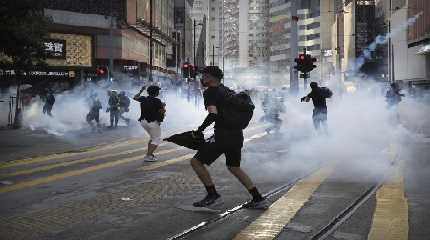
KHARTOUM, Jan 5 (NNN-AGENCIES) — Sudanese security forces fired tear gas at anti-coup protesters in Khartoum chanting slogans against the military days after the resignation of the country’s civilian premier, witnesses said.
Protesters on Tuesday shouted “No, no to military rule” and called for the disbandment of Sudan’s ruling council headed by General Abdel Fattah al-Burhan, who led an Oct 25 coup that derailed a transition to civilian rule.
Thousands of protesters gathered across Sudan, including in Khartoum and its twin city of Omdurman, as well as the eastern city of Port Sudan and the South Darfur capital of Nyala.
Demonstrators in east Khartoum “burned car tyres and built rock barricades on the streets,” witness Sawsan Salah said and protesters urging the military “to go back to the barracks”.
In southern Khartoum and in Bahri, thousands of protesters gathered and tried to march towards the presidential palace, Vall said, but they were “met with tear gas”.
Earlier on Tuesday, Sudanese security forces beefed up security in and around Khartoum as protesters called for mass rallies in a bid to keep up pressure on the military following the resignation of civilian Prime Minister Abdalla Hamdok.
Activists said authorities closed roads in the capital and Omdurman to prevent demonstrators from reaching key government buildings.
“Not all the bridges are closed today, and the internet was not cut off, Vall said. “So far, the protest seems calm, but the pattern is that during the last hours of the afternoon, that’s when [security forces] fire bullets … and crowds get bigger and bigger”.
Hamdok, who was deposed and put under house arrest in an Oct 25 coup, had returned to government on Nov 21 under a deal signed with al-Burhan.
But pro-democracy protesters who had denounced the military’s power grab also rejected its deal with Hamdok, whom they accused of “betrayal” for signing an agreement that ensured the military’s dominance in Sudanese politics.
Tens of thousands of people have continued taking to the streets despite a heavy security crackdown that has killed at least 57 protesters and wounded hundreds since the coup, according to a medical group.
In his televised resignation on Sunday, Hamdok said: “I tried my best to stop the country from sliding towards disaster” and cited “fragmentation of the political forces and conflicts between the [military and civilian] components of the transition”.
Hamdok had served as prime minister for more than two years under a power-sharing arrangement between civilian leaders and the generals who removed longtime leader Omar al-Bashir in April 2019.
Tuesday’s protests have been called by the Sudanese Professionals Association and the Resistance Committees, which were the backbone of the popular uprising that al-Bashir’s removal.
The protest movement insists on a fully civilian government to lead the transition towards elections, a demand rejected by the generals who say power will be handed over only to an elected government.
Elections are planned for July 2023.
UN Secretary-General Antonio Guterres called for “meaningful dialogue” between all Sudanese parties to “reach an inclusive, peaceful and lasting solution,” according to UN spokesman Stephane Dujarric.
The United States and European Union warned Sudan’s military on Tuesday against naming its own prime minister.
The so-called troika on Sudan – the US, Britain and Norway – and the EU “will not support a prime minister or government appointed without the involvement of a broad range of civilian stakeholders,” a joint statement said.




